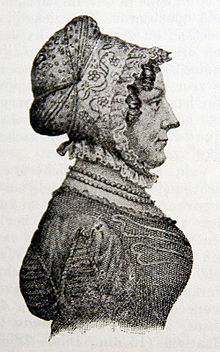Katharina Wilhelmina Bilderdijk-Schweickhardt
Katharina Wilhelmina Bilderdijk-Schweickhardt (born July 3, 1776 in The Hague , † April 16, 1830 in Haarlem ) was the second wife of the Dutch poet Willem Bilderdijk and herself also known as a poet .
life and work
After living in Delft for some time, she moved to London in 1787 with her father, the German painter Schweickhardt. There she turned to the English language studies. Because of her origins, she spoke Standard German and also practiced French, Spanish and Italian. Shortly before meeting Willem Bilderdijk, she wrote the English-language tragedy “Fatal Love”, which was later translated into Dutch as “Elfriede”.
After Katharina Wilhelmina Bilderdijk-Schweickhardt and Willem Bilderdijk got married in 1797, Bilderdijk-Schweickhardt occupied himself extensively with Dutch poetry . She wrote many verses of the "Poëzy", which was published in 1803 by her husband. The sections signed C. W S. or K. W. B. are from her pen. Before her father died in 1797, she moved to Braunschweig with her husband .
A short time later, “Ifigenia in Aulis” appeared after Racine. In the course of this, “De overstrooming” was also published, an elegy about the floods that plagued the Netherlands. In addition, she published a book of poems “Gedichten voor kinderen” in 1813 and made contributions to “Hollands verlosing”, the “Vaderlandsche ontboezemingen” and “Wit een Rood”. In 1816 the two tragedies "Ramiro" and "Dargo" and the band "Ter gedachtenis van Willem Bilderdijk" (In memory of Willem Bilderdijk) appeared. In 1820 she published another volume of poetry, followed by "Poems" and "Nieuwe Gedichten". She has also translated a poetic work by Robert Southey into Dutch verse under the title "Rodrigo de Goth" .
Her poems stood out among other female poets of her time through a keen sense and a flowing form. Often her poems were bound together with those of her husband. She delivered stories from French, English and German.
Her poetry appeared collected in 3 volumes (Haarlem 1858-60), edited by Da Costa.
Honors
- In 1816 she received an honorary award from the Koninglijke Maatschappij van Schoone Kunsten en Letterkunde in Ghent for a cantata on "Veldslag van Waterloo", the battle of Waterloo .
- In 1828 she was made an honorary member of the Koninglijke Maatschappij van Vaterlandsche Taal- en Letterkunde in Brugge .
Individual evidence
- ↑ a b Winkler-Prins': Geïllustreerde Encyclopaedie , Derde Druk, Uitgevers-Maatschappy “Elsevier”, Amsterdam 1906. Volume 3, p. 477.
| personal data | |
|---|---|
| SURNAME | Bilderdijk-Schweickhardt, Katharina Wilhelmina |
| BRIEF DESCRIPTION | Dutch poet |
| DATE OF BIRTH | July 3, 1776 |
| PLACE OF BIRTH | The hague |
| DATE OF DEATH | April 16, 1830 |
| Place of death | Haarlem |

